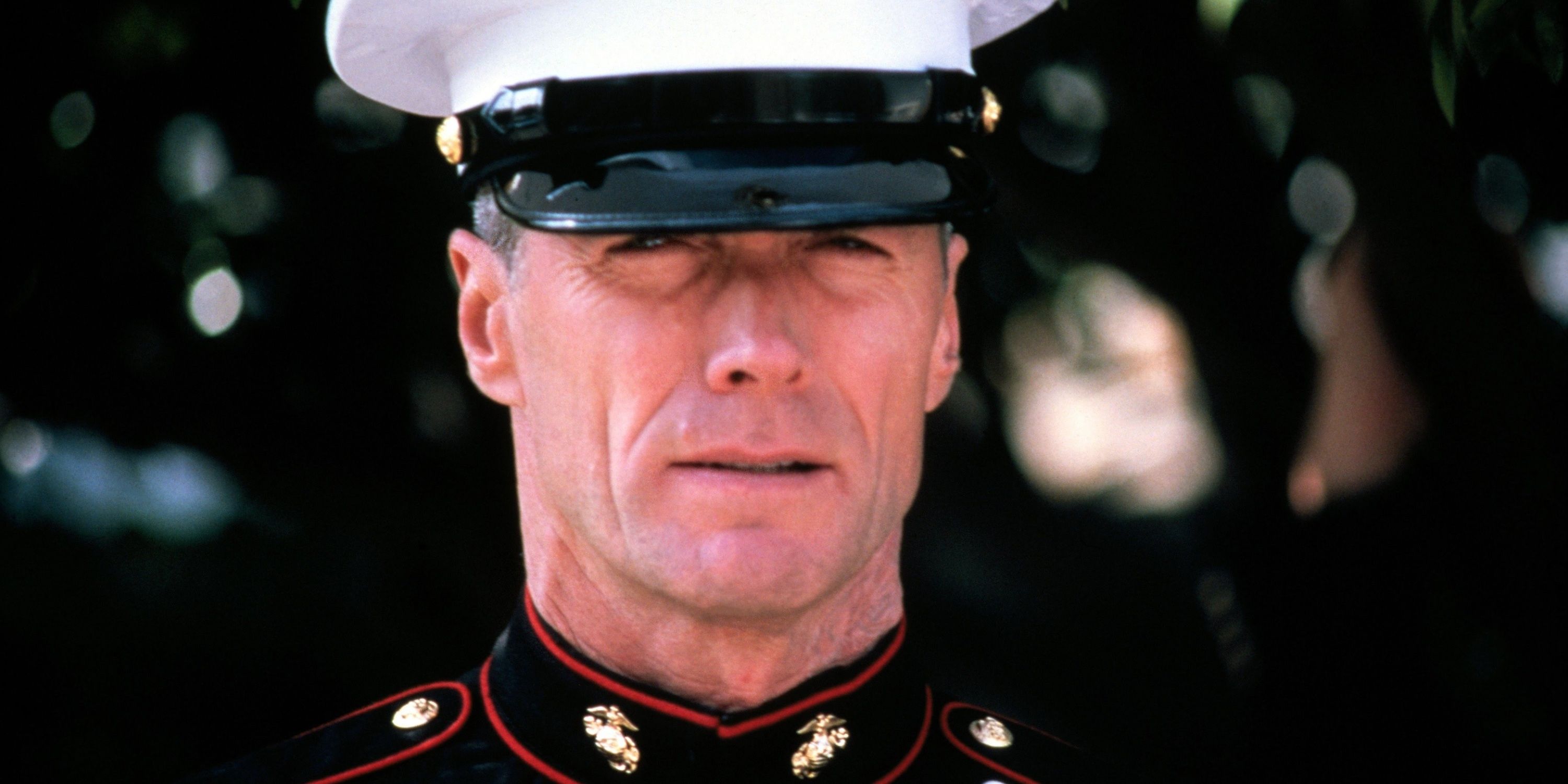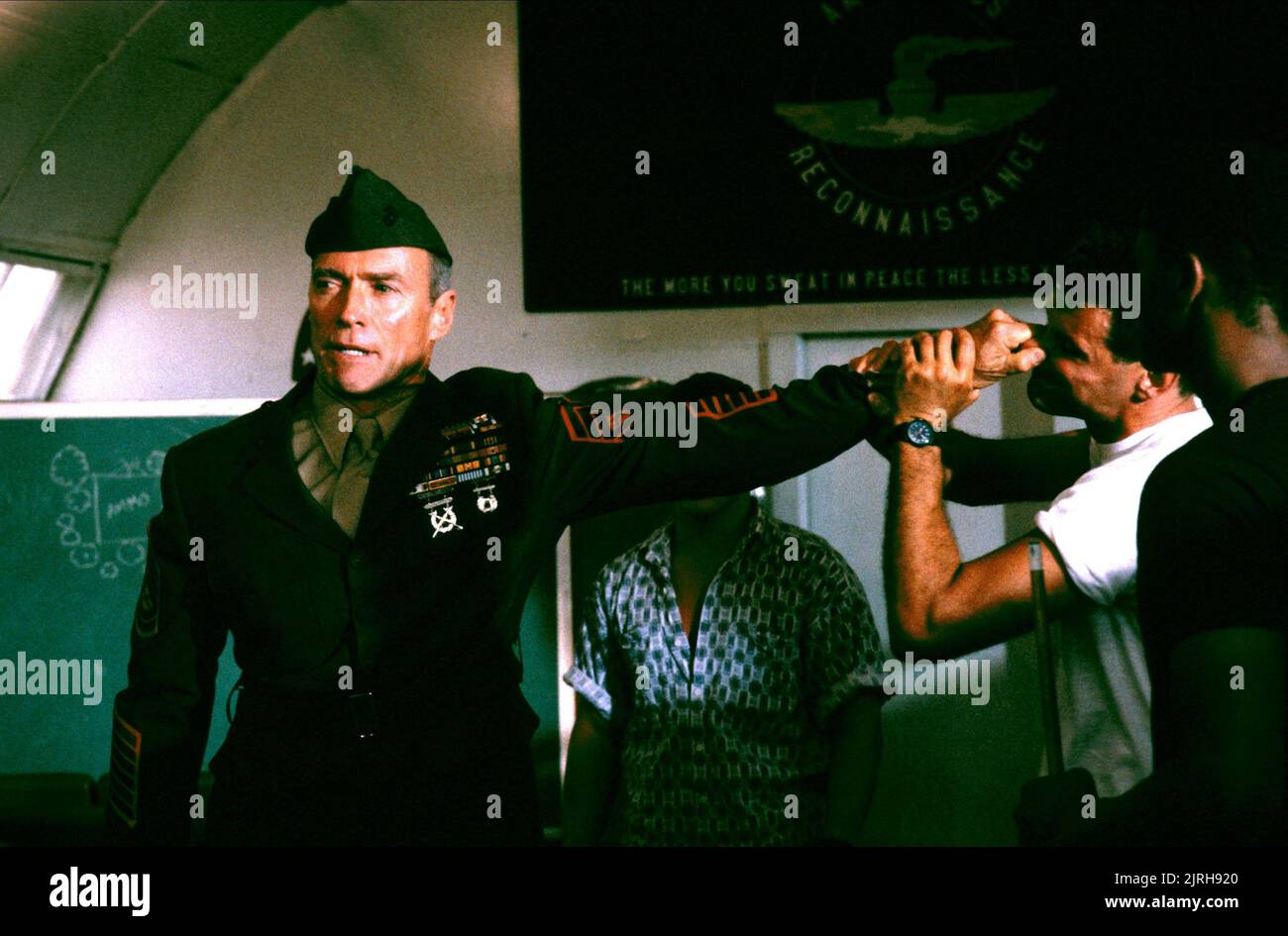When you hear about a powerful war story, especially one with a strong moral core, it's almost natural to think of certain filmmakers. For many, that brings Clint Eastwood to mind, a director known for his gritty, heartfelt portrayals of courage and conflict. So, it's really no surprise that the search term "hacksaw ridge clint eastwood" pops up quite often. People are curious, you see, wondering if this acclaimed movie, with its stunning visuals and profound message, somehow bears his distinctive touch.
This film, *Hacksaw Ridge*, truly left a mark on audiences worldwide. It tells the incredible, true story of Desmond Doss, a conscientious objector who, as a medic during World War II, saved 75 lives without ever carrying a weapon. The sheer bravery and unwavering conviction shown in the movie resonate deeply, and that, is that, often aligns with the kind of storytelling many expect from a director like Eastwood, who has given us so many memorable tales of American heroes.
Yet, while the movie certainly shares a spirit with some of Eastwood's own works, he actually wasn't the one at the helm. This piece will explore the enduring appeal of *Hacksaw Ridge*, delve into why Clint Eastwood's name might be linked to it in people's minds, and, you know, shed some light on the film's true creative forces. We'll also look at the interesting double meaning behind the film's title, connecting it to the very tools that bear its name.
Table of Contents
- Who Is Clint Eastwood? A Look at a Hollywood Legend
- Hacksaw Ridge: The True Story and Its Director
- The Hacksaw Connection: More Than Just a Ridge
- Why the Clint Eastwood Association Persists
- The Impact and Legacy of Hacksaw Ridge
- Frequently Asked Questions
Who Is Clint Eastwood? A Look at a Hollywood Legend
Clint Eastwood is, in a way, a titan of American cinema. For decades, he's been a prominent figure, first as an actor, then as a highly respected director and producer. He's widely known for his stoic, tough-guy roles, particularly in Westerns and action films. But his directing career shows a much broader range, often focusing on stories of resilience, moral dilemmas, and the human spirit.
His films frequently explore themes of justice, sacrifice, and the often messy reality of heroism. Think about movies like *Unforgiven*, *Million Dollar Baby*, or *American Sniper*. These are stories that really dig deep into character and consequence. It's this particular style and thematic preference that probably leads many to wonder if he was involved with a film as emotionally intense and morally driven as *Hacksaw Ridge*.
Personal Details and Bio Data of Clint Eastwood
| Full Name | Clinton Eastwood Jr. |
| Born | May 31, 1930 |
| Birthplace | San Francisco, California, USA |
| Occupations | Actor, Film Director, Producer, Composer |
| Notable Directing Works | Unforgiven, Mystic River, Million Dollar Baby, Letters from Iwo Jima, American Sniper |
| Awards | Multiple Academy Awards (Best Director, Best Picture), Golden Globe Awards, and more. |
Hacksaw Ridge: The True Story and Its Director
*Hacksaw Ridge* tells the absolutely remarkable true account of Desmond Doss, an Army medic during World War II who served in the Battle of Okinawa. What makes his story so unique is that he was a Seventh-day Adventist and, because of his deep personal beliefs, refused to carry a weapon or kill enemy soldiers. This stance, naturally, earned him ridicule and even court-martial attempts from his fellow soldiers and superiors.
Despite all that, Doss stuck to his convictions. During the brutal fighting on Hacksaw Ridge, a particularly treacherous escarpment, he single-handedly rescued dozens of wounded soldiers from behind enemy lines, all while under heavy fire. He did this over and over, lowering each man down the cliff face to safety. His actions earned him the Medal of Honor, the first conscientious objector to receive such an honor. It's a story of incredible moral fortitude and physical courage.
So, who actually brought this powerful narrative to the big screen? The director of *Hacksaw Ridge* was Mel Gibson. Gibson, a very, very talented filmmaker in his own right, is known for directing epic, often violent, and deeply spiritual films like *Braveheart* and *The Passion of the Christ*. His distinct style, which includes a strong emphasis on historical detail and intense, visceral action, was perfectly suited to tell Desmond Doss's harrowing yet inspiring story.
The Hacksaw Connection: More Than Just a Ridge
The name "Hacksaw Ridge" isn't just a geographical location; it almost seems to evoke the very idea of cutting through something incredibly tough. And, you know, when we think about what a hacksaw actually does, it makes a lot of sense. A hacksaw, for instance, is a type of saw that has small teeth and is primarily used for cutting metal. But it can also cut through plastic, and, really, harder materials that typical hand saws just can't handle.
These rugged tools, the ones we often supply, have thin blades, small teeth, and a durable frame. They're built for higher dependability, straighter cuts, and dependable results, even when you're working with something incredibly resistant. For several decades now, hacksaw blades have used high speed steel for their teeth, giving greatly improved cutting and tooth life. It’s a tool designed for precision and perseverance against difficult surfaces.
In a way, Desmond Doss was like a human hacksaw on that ridge. He had to cut through seemingly insurmountable obstacles—the enemy fire, the treacherous terrain, the skepticism of his own comrades—all with an unwavering resolve. His actions, like the precise, persistent work of a hacksaw, allowed him to separate the living from the dead, bringing them to safety. It's a powerful metaphor, isn't it? The film captures this spirit, showing how even the most resistant situations can be overcome with the right kind of determination. You can find an assortment of metal hacksaw tools here in sizes ranging from standard to mini hacksaws, if you're ever looking for a tool that embodies such resilience. Learn more about tools on our site.
Why the Clint Eastwood Association Persists
The connection people make between *Hacksaw Ridge* and Clint Eastwood, even though he didn't direct it, is actually quite understandable. For one thing, Eastwood has a long history of directing acclaimed war films. He made *Flags of Our Fathers* and *Letters from Iwo Jima*, which both came out in the same year and offered different perspectives on the Battle of Iwo Jima. These films, like *Hacksaw Ridge*, explore the human cost of war and the complexities of heroism.
Also, both Eastwood and Gibson, in their directorial styles, tend to favor a very direct, unflinching approach to violence and the realities of combat. They don't shy away from showing the brutal nature of war, but they always do so with a clear focus on the human element and the moral choices characters face. This shared sensibility, in some respects, makes it easy to confuse their work, especially for casual moviegoers.
Furthermore, the true story of Desmond Doss, a man who stood firm in his convictions against immense pressure, really aligns with the kind of character studies Eastwood often presents. His films frequently feature individuals who operate on their own moral compass, sometimes against the tide. So, it's pretty clear why someone might think, "Oh, this feels like an Eastwood film." It just goes to show the powerful impact a director's signature style can have on how audiences perceive similar stories.
The Impact and Legacy of Hacksaw Ridge
*Hacksaw Ridge* was a significant critical and commercial success when it premiered. It received numerous awards and nominations, including several Academy Award nominations, and it really resonated with audiences who were moved by Desmond Doss's extraordinary bravery. The film is often praised for its compelling storytelling, intense battle sequences, and the powerful performance by Andrew Garfield as Doss.
The movie's lasting legacy is, in a way, its ability to bring a relatively unknown but incredibly important true story to a global audience. It reminds us that heroism comes in many forms, and that conviction, even without a weapon, can be a formidable force. It also sparked conversations about faith, pacifism, and the different ways individuals contribute during wartime. It remains a very, very powerful piece of cinema, years after its debut in 2016.
Its impact is clear, too it's almost, in how it continues to be searched for and discussed, even with slight misattributions like the "Clint Eastwood" connection. This ongoing interest shows how deeply the story of Desmond Doss, and the way it was told, captured the public's imagination. It’s a testament to the film's enduring quality and the timeless nature of its themes. You can learn more about the film's production and historical accuracy on various film review sites, for instance, like IMDb.
Frequently Asked Questions
Did Clint Eastwood direct the movie Hacksaw Ridge?
No, Clint Eastwood did not direct *Hacksaw Ridge*. The film was actually directed by Mel Gibson. While Eastwood has directed many acclaimed war films, this particular movie was not one of his projects.
What is Hacksaw Ridge about?
*Hacksaw Ridge* tells the true story of Desmond Doss, an American Army medic during World War II. He was a conscientious objector who, because of his beliefs, refused to carry a weapon. Despite this, he bravely saved 75 lives during the Battle of Okinawa without firing a single shot.
Why is the movie called Hacksaw Ridge?
The movie gets its name from a very steep, heavily fortified escarpment on Okinawa, Japan, where a brutal battle took place during World War II. This particular location was known as Maeda Escarpment, but soldiers nicknamed it "Hacksaw Ridge" because of how difficult it was to scale and the intense, almost "sawing" nature of the fighting that happened there. It was a place where you had to cut through extreme challenges.
We hope this exploration has cleared up any questions about *Hacksaw Ridge* and its connection to Clint Eastwood. The film stands as a remarkable achievement, telling a truly inspiring story of courage and conviction. If you haven't seen it, we strongly recommend you experience this powerful narrative for yourself. To explore more about the impact of historical films and their directors, check out this page filmmaking insights.



Detail Author:
- Name : Mr. Theo Gleichner
- Username : tromp.marilou
- Email : haag.clifton@yahoo.com
- Birthdate : 1987-12-06
- Address : 564 Nya Well Apt. 682 Lake Aiden, KY 74764-6116
- Phone : (740) 352-8922
- Company : Wisoky-Nicolas
- Job : Dental Hygienist
- Bio : Numquam rem error eius ut mollitia debitis molestiae. Minima at et laborum fugiat vel. Explicabo ex fugit qui doloribus et.
Socials
linkedin:
- url : https://linkedin.com/in/fritsch2011
- username : fritsch2011
- bio : Odio quia dolorum sed.
- followers : 6258
- following : 2760
twitter:
- url : https://twitter.com/shania_fritsch
- username : shania_fritsch
- bio : Provident sed veniam laboriosam. Est eaque et eaque quaerat ex nihil illum. Nisi nisi aut autem quia rerum cum at sequi.
- followers : 6599
- following : 635